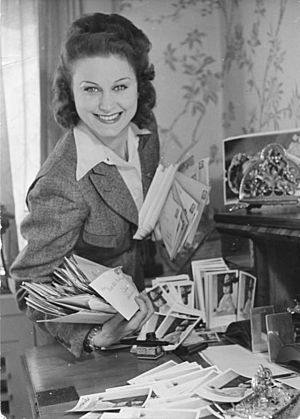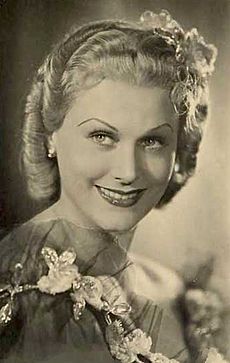Marika Rökk facts for kids
Marika Rökk (born Marie Karoline Rökk, 3 November 1913 – 16 May 2004) was a famous Hungarian dancer, singer, and actress. She became very popular in German films during the Nazi era. After World War II, she continued her career. Marika Rökk became one of Europe's most well-known operetta singers. She performed on stage until 1986.
Contents
Life and Career Highlights
Early Life and Dance Training
Marika Rökk was born Marie Karoline Rökk in 1913 in Cairo, Egypt. Her father, Eduard Rökk, was a Hungarian architect. Her mother was Maria Karoline Charlotte Rökk. Marika spent her early childhood in Budapest, Hungary.
In 1924, her family moved to Paris, France. There, her father had a work contract. In Paris, Marika learned to dance. She performed with the Hoffmann Girls at the famous Moulin Rouge cabaret.
Journey to Broadway and First Film
Marika Rökk went on a dance tour that took her to Broadway in the United States. She continued her dance training there. She worked with a famous choreographer named Ned Wayburn.
In 1929, she returned to Europe. The next year, she acted in her first film. It was a British comedy called Why Sailors Leave Home. The film was directed by Monty Banks.
Becoming a German Film Star
Marika Rökk became truly famous when the German film studio Universum Film AG (UFA) noticed her. UFA wanted to create a German film star. They hoped she could compete with popular Hollywood musical actresses.
Joseph Goebbels, a powerful official in Germany at the time, admired Hollywood movies. He wanted Germany to have its own big stars. He also wanted Germany to make films that could rival Hollywood's colorful musicals.
Marika Rökk was already a celebrated dancer in Europe. She was chosen to become this new type of star. In 1934, she signed a two-year contract with UFA. She quickly became one of the most active film stars of that time.
Her first German film was Leichte Kavallerie (Light Cavalry) in 1935. This movie made her an overnight sensation.
Rise to Popularity
Leichte Kavallerie was the first of many lighthearted musical films. These movies quickly made Marika Rökk one of Germany's most popular actresses. These films were similar to the successful musical movies made in Hollywood.
Marika had the talent and charm to make these films work. She gave German audiences a local star to enjoy. She starred with Johannes Heesters in films like Der Bettelstudent and Gasparone. They became known as the "dream couple" of musical comedies.
Marika often used her Hungarian accent in her performances. This gave her an exotic and charming image. Her films were not openly political. They were popular in many parts of Europe.
Peak of Her Career and Wartime Role
In 1940, Marika Rökk starred in Kora Terry. She played two roles: good and evil twin sisters. This film, directed by her future husband Georg Jacoby, showed her wide range of acting and dancing skills.
She also appeared in the film Wunschkonzert in 1940. In 1941, she starred in Women Are Better Diplomats. This was UFA's first film made with Agfacolor, a special color film process.
Marika reached the highest point of her career in 1944. She had the main role in The Woman of My Dreams. This was a grand musical color film, also directed by Jacoby. While her movies did not have obvious political messages, she helped entertain the German people during World War II. This was part of Goebbels' plan.
Post-War Career and Personal Life
After the war, Marika Rökk was temporarily not allowed to work. However, she was cleared in 1947. She was then able to continue her film career in West Germany and Austria.
In 1948, she received the German Bambi media award. Marika Rökk became one of Europe's most famous operetta singers. She continued to perform on stage until 1986.
Her first husband, Georg Jacoby, passed away in 1964. She then married Hungarian actor Fred Raul in 1968. He passed away in 1985. Marika Rökk was the mother of actress Gabriele Jacoby.
In 1994, there were reports that Marika Rökk might have helped Soviet intelligence during World War II. These reports claimed she sent information to the Soviet Union. In 2017, more documents were reported to suggest this. However, these reports were later described as unfounded.
Death
Marika Rökk died from a heart attack in Baden bei Wien, Austria, in 2004. She was 90 years old.
Awards and Recognition
- 1948, 1968, 1987, 1990, 1998 Bambi (a German media award)
- 1981 Deutscher Filmpreis, Special Award for Outstanding Contributions to German Cinema
- 1987 Bavarian Film Awards, Best Actress
Filmography
- Why Sailors Leave Home (1930)
- Kiss Me Sergeant (1932)
- Csókolj meg, édes! (1932)
- Kísértetek vonata (1933)
- Leichte Kavallerie (1935)
- Heißes Blut (1936)
- The Beggar Student (1936)
- Und du mein Schatz fährst mit (1937)
- Carousel (1937)
- Gasparone (1937)
- Eine Nacht im Mai (1938)
- Tanzendes Herz (1939)
- Vadrózsa (1939)
- The Life and Loves of Tschaikovsky (1939)
- Hello Janine! (1939)
- Kora Terry (1940)
- Wunschkonzert (1940)
- Zirkusblut (1940)
- Frauen sind doch bessere Diplomaten (1941)
- Tanz mit dem Kaiser (1941)
- Love Me (1942)
- The Woman of My Dreams (1944)
- Fregola (1948)
- Child of the Danube (1950)
- Sensation in San Remo (1951)
- The Csardas Princess (1951)
- Mask in Blue (1953)
- The Divorcée (1953)
- At the Green Cockatoo by Night (1957)
- Das gab's nur einmal (1958)
- Bühne frei für Marika (1958)
- The Night Before the Premiere (1959)
- My Husband, the Economic Miracle (1961)
- Heute gehn wir bummeln (1961)
- Wedding Night in Paradise (1962)
- Die Fledermaus (1962)
- Die Schöngrubers (1972) (TV series) (13 episodes)
- Der letzte Walzer (1973)
- Schloß Königswald (1988)
See also
 In Spanish: Marika Rökk para niños
In Spanish: Marika Rökk para niños



